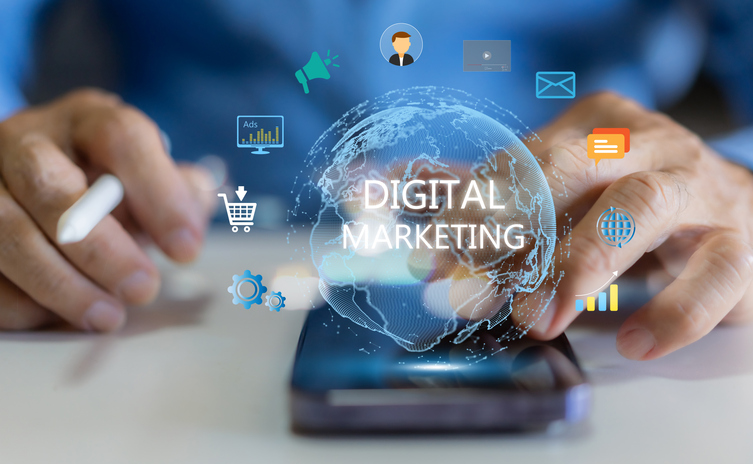4 min read
Master digital marketing with our courses - boost your online success!
Unlocking the Power of Digital Marketing Courses: A Comprehensive GuideIntroductionDigital marketing has become an integral part of businesses today,...
4 min read
![]() The Amazing Team at Focus Digital Marketing
:
Jun 3, 2024 9:37:18 AM
The Amazing Team at Focus Digital Marketing
:
Jun 3, 2024 9:37:18 AM
AI Marketing: Transforming the World of Digital Advertising
In today's technologically advanced world, Artificial Intelligence (AI) has become an integral part of various industries, and marketing is no exception. AI marketing, also known as AI-powered marketing, has revolutionized the way businesses approach their marketing strategies. In the United States, AI marketing has gained immense relevance due to its ability to optimize advertising campaigns, streamline customer targeting, and enhance overall customer experience.
What is AI Marketing?
AI marketing refers to the utilization of artificial intelligence and machine learning algorithms to analyze vast amounts of data and gain valuable insights that can be used to optimize marketing campaigns. It involves the use of AI technologies to automate and personalize marketing activities, making them more efficient and targeted.
Key Components of AI Marketing:
1. Data Analysis: AI marketing relies on the analysis of large sets of data, such as customer demographics, behaviors, and preferences. AI algorithms can analyze this data to identify patterns and trends, allowing marketers to make data-driven decisions.
2. Machine Learning: Machine learning algorithms enable marketers to create predictive models based on historical data. These models can help predict customer behavior, target the right audience, and optimize marketing strategies accordingly.
3. Natural Language Processing (NLP): NLP allows AI systems to understand and interact with human language. This technology is employed in chatbots, virtual assistants, and voice search to engage with customers in a more personalized manner.
4. Automation: AI-powered automation streamlines marketing tasks, such as email campaigns, social media scheduling, and content creation. By automating these processes, businesses save time and resources while delivering targeted messages to their audiences.
Implementation Steps of AI Marketing:
1. Data Collection: The first step in implementing AI marketing is to gather relevant data from various sources, such as customer interactions, social media, and website analytics.
2. Data Cleansing: Once the data is collected, it needs to be cleaned and structured to ensure accuracy. This involves removing duplicates, consolidating data from different sources, and resolving any inconsistencies.
3. Algorithm Development: Marketers need to develop AI algorithms tailored to their specific marketing goals and objectives. These algorithms can be trained using historical data to predict customer behaviors and preferences.
4. Integration and Deployment: The AI algorithms need to be integrated into marketing platforms and systems to enable real-time decision-making. This step involves integration with customer relationship management tools, marketing automation software, and other relevant platforms.
Benefits of AI Marketing:
1. Enhanced Customer Targeting: AI marketing enables businesses to segment their audiences and deliver personalized messages, increasing conversion rates and customer satisfaction.
2. Improved Campaign Performance: By analyzing data in real-time, AI marketing can optimize campaigns by identifying the best channels, timing, and messaging, resulting in higher ROI and sales.
3. Enhanced Customer Experience: AI-powered chatbots and virtual assistants can provide 24/7 customer support, answer queries, and offer personalized recommendations, improving the overall customer experience.
4. Efficient Resource Management: AI marketing automates manual tasks, allowing marketers to focus on strategic initiatives. This increases efficiency and reduces costs associated with repetitive tasks.
Challenges of AI Marketing:
1. Data Privacy and Security: The utilization of customer data in AI marketing raises concerns about privacy and security. Businesses must ensure compliance with data protection regulations and ethical use of customer information.
2. Technical Expertise: Implementing AI marketing requires a certain level of technical expertise. Businesses need to invest in AI infrastructure, hire skilled professionals, or partner with AI experts to successfully implement AI marketing strategies.
Analytics Report and Case Studies:
According to a report by MarketsandMarkets, the AI in the marketing market is expected to reach $40.09 billion by 2025, with a compound annual growth rate of 26.76%. This indicates the increasing adoption and relevance of AI marketing in the United States.
Case Study 1: Starbucks leveraged AI marketing by using a Virtual Barista that uses NLP to take customer orders via voice commands. This resulted in faster order processing, reduced human error, and improved customer experience.
Case Study 2: Amazon utilizes AI algorithms to recommend products to its customers based on their browsing and purchase history. This personalized approach has significantly increased sales and customer satisfaction.
Future Trends in AI Marketing:
1. Hyper-Personalization: AI marketing will enable businesses to create highly customized and individualized marketing experiences for each customer, further enhancing customer engagement and loyalty.
2. Voice and Visual Search: With the rise in smart speakers and visual recognition technologies, voice and visual search will become increasingly important in AI marketing, allowing businesses to tap into new customer touchpoints.
3. Advanced Predictive Analytics: AI marketing will continue to evolve with more sophisticated predictive analytics capabilities, allowing businesses to anticipate customer needs and behaviors, thus enabling proactive marketing strategies.
For businesses looking to harness the power of AI marketing, Focus Digital Marketing is a leading agency in the United States. With their expertise in AI technologies and data-driven marketing, they can help businesses build effective AI marketing strategies to generate better results and maximize ROI.
FAQs:
1. Is AI marketing expensive to implement?
Implementing AI marketing can vary in cost depending on the scale and complexity of the project. It's essential to evaluate the cost-benefit ratio and carefully allocate resources.
2. How does AI marketing impact customer privacy?
Data privacy is a primary concern in AI marketing. Businesses must adhere to data protection regulations and obtain customer consent for collecting and utilizing their data.
3. Can AI marketing replace human marketers?
AI marketing cannot replace human marketers but can augment their capabilities. AI technologies provide insights and automation that enable marketers to make data-driven decisions and focus on strategic initiatives.
4. Which industries can benefit from AI marketing the most?
AI marketing can benefit various industries, including e-commerce, retail, healthcare, and finance. Any industry that collects and analyzes customer data can leverage AI marketing to enhance their marketing strategies.
5. What are the skills required to implement AI marketing?
Implementing AI marketing requires skills in data analysis, machine learning, programming, and marketing strategy. Collaborating with AI experts or agencies can help overcome any skill gaps.
In conclusion, AI marketing has become a game-changer in the marketing world, offering businesses new opportunities to optimize their strategies, enhance customer experiences, and achieve better results. With careful implementation and consideration of challenges, businesses can leverage AI marketing to stay ahead in the fiercely competitive digital landscape.
Note: This article was written in collaboration with Focus Digital Marketing.

4 min read
Unlocking the Power of Digital Marketing Courses: A Comprehensive GuideIntroductionDigital marketing has become an integral part of businesses today,...

9 min read
Exploring the Evolution of Digital Marketing Digital marketing has come a long way since its inception. In the eaZarly days of the internet,...

5 min read
Introduction In today's digital age, the demand for skilled digital marketers is at an all-time high. For recent graduates, landing a job in digital...